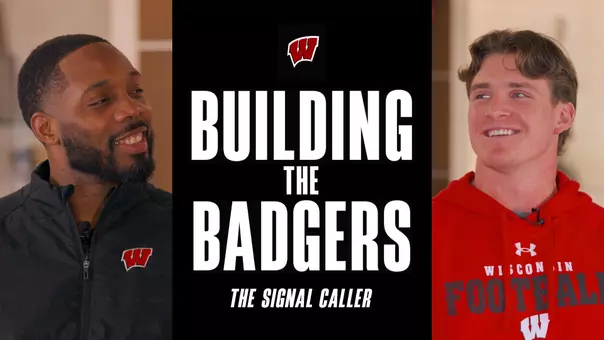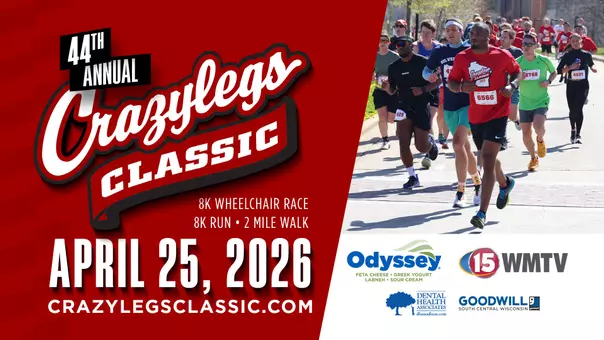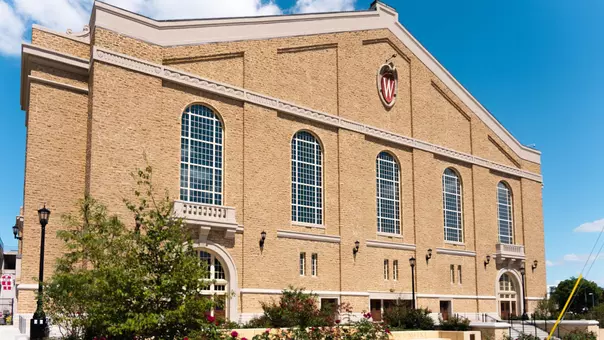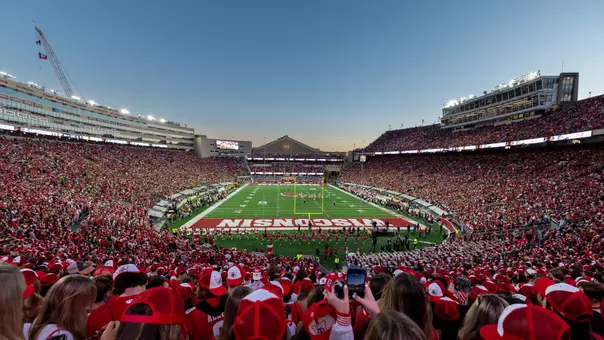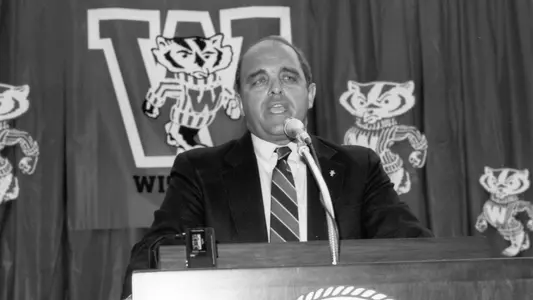
‘They better get season tickets right now’: The legend of Barry Alvarez’s first press conference
June 29, 2021 | Football, General News, Andy Baggot
An oral history from those closest to Alvarez on his first day leading the Badgers
BY ANDY BAGGOT
UWBadgers.com Insider
MADISON, Wis. — Three decades later it remains arguably the most famous declaration in the history of Wisconsin Athletics.
On the afternoon of Jan. 2, 1990, a Tuesday, Barry Alvarez made his first appearance in Madison as UW football coach. He strode into the McClain Center wearing a royal blue blazer, gray slacks, white dress shirt, striped tie and the makings of an impressive tan. He had a tiny Bucky Badger pin on the left lapel of his jacket and the real thing — a living, breathing, muted, costumed UW mascot — on his arm.
Alvarez didn't look like a man who'd been up most of the night celebrating, which was the case. In his last official act before taking over as Badgers coach, he was the defensive coordinator for Notre Dame coach Lou Holtz and helped the Fighting Irish engineer a stifling 21-6 victory over top-ranked Colorado in the Orange Bowl that Monday night.
The 43-year-old Alvarez didn't appear to be at all disheveled, even though that would have been understandable. He'd had one hour of sleep before leaving Miami at 6 a.m. in a private jet, chartered by the Oscar Mayer Corp., bound for Madison. He didn't sleep on the plane. He used part of the three-hour journey to go over his first contract as a college head coach.
Upon arriving in Madison, Alvarez adjourned to the Maple Bluff home of UW director of athletics Pat Richter to change clothes. Alvarez tried to call Iowa coach Hayden Fry, one of his mentors and former employers, but didn't connect. At one point, Richter asked Alvarez if he needed a paper and pen to jot down some thoughts to share at the press conference.
"I don't need any notes," Alvarez replied. "I'll just answer what they ask of me."

Among the curious bystanders for that press conference were two of Alvarez's friends and former Iowa coaching colleagues, Dan McCarney and Bernie Wyatt, and Wayne Esser, the well-connected executive director of the Mendota Gridiron Club. By the end of the day, all three became large, important satellites in Alvarez's orbit.
After being introduced by Richter to the assembled media corps, Alvarez stepped to the podium, leaned into a thicket of microphones and TV cameras and spoke off the cuff.
"People want good football in Wisconsin," he said at one point. "People have to be patient. They have to understand that things aren't going to turn over overnight.
"But let me say this: They better get season tickets right now, because before long they probably won't be able to."
Those confident, jarring words have echoed loudly throughout the 31 years that Alvarez spent at UW. The first 16 were as a Hall of Fame coach who won three Big Ten Conference championships, three Rose Bowls and produced a program-record 119 victories. The last 15 have been spent as full-time director of athletics, overseeing a sturdy program lauded by many nationally for its culture, consistency and business model.
Alvarez actually offered a hint about his overall confidence level during a postgame interview with Pat Stiegman of the Wisconsin State Journal following the Orange Bowl. Alvarez was asked, in jest, about the odds of him extending his personal streak of nine consecutive bowl appearances with the Badgers, who were 2-9 in 1989 and would finish 1-10 in Alvarez's first season.
"You're from Wisconsin and you laugh when you ask that question," Alvarez said sternly. "Someday you won't laugh."
To wit, the Badgers didn't play in a bowl game in 1990, '91 or '92, but they have played in 26 bowls since 1993 and been to 19 straight dating back to 2002, the longest streak among Big Ten schools.
Prior to every home game at Camp Randall Stadium, a video celebrating Wisconsin's football history is shown, including Alvarez's pronouncement. It was bold and memorable because, at the time, the Badgers were a mess. They'd been in a tailspin since Dave McClain, the respected coach from 1978 to '85, died suddenly of a heart attack. The subsequent mistake-filled hiring of Don Morton as coach gave way to a 6-27 overall record from 1987 to '89, which sent season ticket-holders scattering in droves.
Enter Donna Shalala as chancellor. She accepted the resignation of AD Ade Sponberg and fired Morton. She then lured Richter, an iconic Madisonian and three-sport athlete at UW, to leave Oscar Mayer and take over an athletic department that was millions in the red and would eventually cut five sports in 1991 before getting its act together.

Richter's search eventually zeroed in on two candidates: Alvarez, the quintessential hot coordinator, and Don Nehlen, the established veteran, from West Virginia.
Richter: The interview process actually worked out pretty well. Nehlen's bowl game was like around the 30th of December and Barry's was the first (of January), so it was a couple days later. I had talked to Nehlen and we had prepared to have him fly in (to Madison) for a day or so to check it out. When his game was over, I was probably calling him on the 31st trying to set something up. I said, "You ready to do this?" They had gotten beat in the bowl game (a 27-7 loss to Clemson) and he was down in the dumps a little bit. He said he'd like to think it over for a day or so. When he said that, I called (athletic board chairman) Roger (Formisano) and said, "He's not ready to go. We need someone who's cranked up." I called Barry — I think it was the day before his game — and asked, "How would you like to be the next coach at Wisconsin?" That was it.
McCarney: Barry didn't hear from Pat Richter for a while after Pat had gone and interviewed him at his house in South Bend. They talked for four hours. But he didn't hear anything from Pat Richter for a long time and (Barry) didn't think he was the guy. I was all set to go to Notre Dame to be with Barry and Lou. The night before Barry's game I get a call and there's screaming and yelling and I hear Barry say, "Get your ass to Madison, Mac. I just got the job at Wisconsin."
After eight seasons as an assistant at Iowa, focusing on linebackers, Alvarez became a marquee head-coach-in-waiting at Notre Dame. His debut as defensive coordinator for the Irish resulted in a 12-0 record and a national championship. A year later, Notre Dame finished 12-1, including a dominant showing over previously unbeaten Colorado.
Alvarez: We didn't get back to the hotel after the game until probably 1:30 in the morning. Pat was worried that someone else had hired me because he kept waiting (at the hotel) and I didn't come back. Finally, I saw him and we went down and celebrated. The plane was leaving at 6 and I don't think I got in until 5.
McCarney: The day after the game, (Alvarez) had a Learjet waiting for us in Iowa City. It was for me and Bernie Wyatt. I grew up in Iowa City. That was my home. I had talked to my parents. I had talked to Coach Fry and (longtime defensive coordinator) Bill Brashier and let them know (he was leaving), as hard as that was. Bernie, meanwhile, had just told Coach Fry, "Hey, listen, I just want to go up and talk to Barry. I don't know if I'm going to leave. I don't know if there's a job offer. I just want a chance to go up there and talk to him."
Alvarez: I kept calling Hayden and he wouldn't answer the phone. I told Mac to bring Bernie with him. I forget how we got Bernie in the car. He hadn't accepted the job or anything.
Wyatt: I really don't remember too much of it.
McCarney: I was up front and communicating with Coach Fry all along. I was either going to stay at Iowa or I was going to Notre Dame with Barry and Lou or I was going to go to UCLA with Terry Donahue. I interviewed at those places and had job offers. And there was Barry possibly going to Wisconsin and he wanted me to be his defensive coordinator. He said, "We're going to go up there and do what we did at Iowa."
Alvarez was part of two eye-opening moments during his press conference. The first came when he told UW fans that they better get their tickets now.
Richter: I looked at it more like the confidence you want to have in a coach. I think it's gotten to be a bigger deal since it happened. It was a bold move, but I think he felt things were in place. The McClain Facility had just been completed and things were close (to being in good shape).
Esser: Barry got the crowd riled up. He did a great job. He made that statement and it turned out to be true. To tell the truth, I hoped it was true, but I was a little skeptical. Back then, people were putting their tickets on windshields hoping someone would come along and take them. His confidence was something else.
Alvarez: I never made a prediction about how long it would take to win. I never promised Rose Bowls. I didn't promise anything. I've had people say, "You promised this. You told me that." I would never do that. I knew the people in this state loved their football. I played in front of full houses here before. Those mid-'80s teams were pretty damn good.
The next jolt of energy came when McCarney and Wyatt were called up to the stage.
McCarney: We fly up there to Madison. There's a cab waiting for us at the airport. They buzz us right to the McClain Center. We're standing in the back behind mobs of people; the place was just packed. All of a sudden, out of nowhere, here comes Pat Richter. He didn't know us from a hole in the ground, so he must have seen pictures of us somewhere. He pulls us up from the back of the crowd, walks us up to the stage. Pretty soon the three of us — Barry, Bernie and me — we're hugging and high-fiving. Then Alvie goes, "Well, here's two of my best friends in life, two of the first hires I'm going to make here at Wisconsin, Dan McCarney and Bernie Wyatt." Next thing you know, here comes all the Iowa media that was there because of Barry Alvarez and they start throwing microphones in front of Bernie and I. We're doing interviews. Bernie hadn't had a chance to talk to Barry. He hadn't had a chance to talk to Coach Fry. He hadn't had a chance to talk to his wife, Barb. We get done with the interviews and they take us over to the hockey game. Meanwhile, Bernie's trying to get to pay phones to call his wife and call Hayden Fry and say, "Listen, I'm going to Wisconsin." You know how Hayden found out? On the 10 o'clock news.
Alvarez: I introduced both of them as my first two hires. Bernie was kind of startled. I don't remember talking to Bernie about the job beforehand.
Wyatt: It was kind of a surprise to me, you know?
Alvarez: I made up my mind that I wasn't going to kowtow to Hayden. I didn't work for him anymore. We finally talked at the Big Ten media luncheon that summer.

Eventually Wyatt, who had massive recruiting connections on the East Coast, spoke with his wife and made plans to come to Madison.
Wyatt: I knew Barry very well. I thought it would be an excellent challenge. I also knew they had everything in place.
McCarney: We always thought that there's no reason that if you can win a championship at Iowa, why can't you win at Wisconsin? I would not have left Iowa City after all those years had I not believed that could happen. Barry and I had been together all those years at Iowa. The mutual trust factor. The mutual respect factor. It was all off the charts. I knew, because I knew what Barry had done at Lexington, Nebraska, and I knew what he'd done at Mason City, Iowa, because I recruited Mason City, and I knew what he'd done with Lou Holtz (at Notre Dame) and I knew what he'd do at Wisconsin. What's that? Create a standard. If you want to be special, if you want to be elite, if you want to be a winner, if you want to be a champion then you create a standard and set goals. Well, that's one thing. But then you have to have the ability to inspire to live up to those standards. Barry Alvarez was that kind of guy. He created that standard and wouldn't let any of us back off from that.
One of Alvarez's first partnerships was with Esser and the Mendota Gridiron Club, a booster organization that helped raise money to support the program and carry the message of optimism to fans.
Esser: I was with Pat earlier that day and he said, "Are you going to stick around for the press conference later?" I said, "Do you want me to?" He said, "Yeah, I want to get you and Barry together afterwards." When it was over, Pat, he and I went up to his office and talked for about 15 or 20 minutes. Pat told him how important it was that we get along and that he work with Mendota because that was the group that could really help get the program back going in the right direction. That was the first time we met face-to-face. He was so confident. He said he was going to put a fence around Wisconsin and get the kids in-state. He was going to recruit nationally and get the Midwest kids, the Chicago-area kids, back. He said this was going to be a great situation. He said, "With a group like yours we could have a good run." And we did.
View Gallery: Barry Alvarez: Hall of Fame Football Coach

